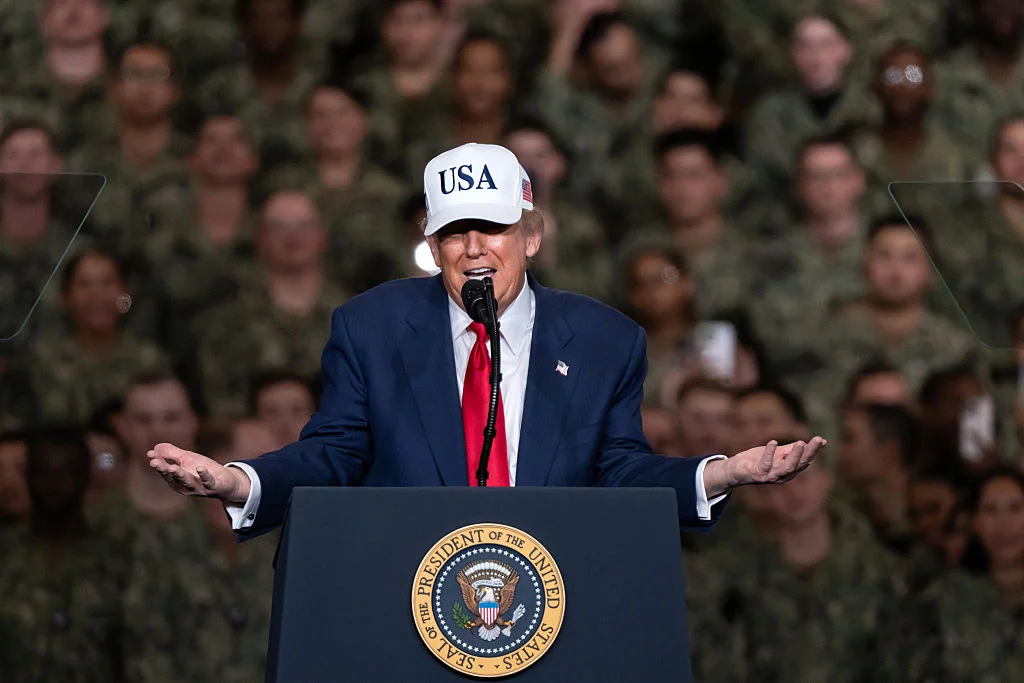A Closer Look at Trump’s Escalating Military Threats
In recent statements, President Donald Trump has heightened his rhetoric around the use of military forces in U.S. cities, expressing a readiness to deploy “more than the National Guard” if necessary. Speaking to military personnel at a Naval base in Japan, Trump emphasized his commitment to ensuring safe urban environments, asserting, “We can’t have cities that are troubled” and pledging immediate action to address violence.
Historical Context of Military Deployment
Since beginning his second term, Trump’s use of the National Guard has predominantly targeted cities governed by Black mayors and with majority Black and Brown populations. Locations such as Los Angeles, Chicago, and Washington, D.C. have seen increased military presence, aligning with Trump’s assertions that these deployments are meant to combat violent crime and protect federal property during protests. While federal law restricts such military involvement to specific conditions like insurrections, Trump has framed his actions as necessary measures to restore order.
Tensions Between State and Federal Leadership
The response to Trump’s military strategies has varied significantly across the political spectrum. While Democratic governors have opposed these actions, Republican governors in states like Tennessee and Louisiana have welcomed the National Guard’s presence in cities like Memphis and New Orleans. However, many of Trump’s deployment plans are currently held up in federal courts, highlighting ongoing legal challenges surrounding the military’s role in domestic affairs, further complicating the situation.
Critiques of Military Actions
Critics have voiced serious concerns regarding the ethical implications of sending military troops into civilian populations. Ed Anderson, a military veteran, has labeled this strategy a “moral failure,” citing incidents where National Guard members have responded to civilian situations in ways that disproportionately affect Black communities. The violent tactics employed in such operations have raised alarms among many who see them as indicative of a broader strategy to sow division and unrest.
The Rhetoric of Fear and Control
Trump’s declaration of ensuring “safe cities” raises questions about the underlying motives of his approach. Critics suggest his actions are part of a strategy to create fear and justify an expanding authoritarianism, echoing sentiments from former Joint Chiefs of Staff chairman General Mark Milley, who described Trump’s inclinations as “fascist to the core.” Trump’s statements appear to resonate with a segment of the electorate that views strength through a militarized lens, yet they provoke significant opposition from those who prioritize civil liberties and community safety.
Potential Impact and Repercussions
The potential repercussions of Trump’s military posturing extend beyond immediate law enforcement concerns to long-term implications for civil rights and the fabric of American democracy. Many experts warn that using “active duty combat-poised troops” in urban areas could escalate tensions and provoke conflict, particularly in communities disproportionately targeted by these policies. This growing militarization of domestic spaces is provoking fears that it could lead to a deeper societal divide.
Political Reactions and Public Sentiment
Marcus W. Robinson, a spokesperson for the Democratic National Committee, expressed skepticism about Trump’s motivations, framing his threats as desperate attempts to assert strength in light of declining approval ratings. Robinson noted that historical precedents show this playbook often fails and emphasized the need for a national dialogue on military use within civilian contexts.
While Trump’s bold claims may rally his base, they simultaneously elicit strong reactions from broader segments of the population who are increasingly wary of such executive overreach. The ongoing discourse around these military deployments illustrates a palpable tension between the pursuit of safety and the maintenance of democratic values.
As these developments continue to unfold, it’s clear that the intersection of military presence and urban governance will remain a contentious topic, with profound implications for the future of American communities and civil rights.



